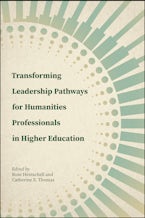Transforming Leadership Pathways for Humanities Professionals in Higher Education includes thirteen essays from a variety of contributors investigating how humanities professionals grapple with the opportunities and challenges of leadership positions. Written by insiders sharing their lived experience, this collection provides an authentic look at the multiple roles humanities specialists play, as well as offers strategies for professional growth, sustenance, and satisfaction. The collection also considers the relationship between disciplinary areas of study, academic training, and the valuable skill sets and habits of mind that serve higher education leaders.
While Transforming Leadership Pathways emphasizes that a leadership route in higher education can be a welcome and positive professional move for many humanities scholars, the volume also acknowledges the issues that arise when faculty take on administrative positions while otherwise marginalized on campus because of faculty status, rank, or personal identity. This collection demystifies the path into higher education administration and argues that humanities scholars are uniquely qualified for such roles. Empathetic, deeply analytical, attuned to historical context, and trained in communication, teachers and scholars who hail from humanities disciplines often find themselves well-suited to the demands of complex academic leadership in today’s colleges and universities.
Acknowledgments
Introduction: Other Duties as Assigned, or Desired, by Roze Hentschell and Catherine E. Thomas
PART 1 LEADERSHIP PATHWAYS
What It Takes: How to Develop Academic Leadership, by Darryl Dickson-Carr
The Politics, Practice, and Poetics of Teaching Leadership, by Philip Robinson-Self
Academic Duck-Rabbit: Faculty Leadership at the Smaller College or University, by Emily Ruth Isaacson
Navigating Networks and Systems: Practicing Care, Clarifying Boundaries, and Reclaiming Self in Higher Education Administration, by Genesea M. Carter, Aurora Matzke, and Bonnie Vidrine-Isbell
PART 2 INTERDISCIPLINARITY AND INNOVATION IN HIGHER EDUCATION ADMINISTRATION
Administering Antidisciplinarity: Navigating a Diverse Career Path from Theory to Institutional Practice, by Ryan Claycomb
“We Know What We Are, but Know Not What We May Be”: Academic Innovation and the Reinvention of Professional Identities, by Laurie Ellinghausen
7 Administering Instructional Reform: Interdisciplinary Learning and the Humanities Profession, by Anne-Marie E. Walkowicz
PART 3 LEADERSHIP, EQUITY, AND SOCIAL JUSTICE
8 Leading While Young, Black, and on the Tenure Track, by Chyna N. Crawford
9 Leading through Precarity: A Tale of (Un)Sustainable Professional Advancement, by Kristina Quynn
10 Ito Ang Kwento Ko: Pinayist Pedagogy/Praxis and Community College Leadership, by Rowena M. Tomaneng
PART 4 COMMUNITY, COMMUNICATION, AND CALLING
11 Collaborative, Introverted Leadership: Engaging Your Stakeholders to Move a Program Forward, by Emily J. Morgan
12 Communication and Crisis Management: A Case Study and a Cautionary Tale, by Michael Austin
13 Vocation and the Drudgery I Love, by Sean Benson
Coda: Leaning in to Twenty-First-Century Leadership, by Roze Hentschell and Catherine E. Thomas
Contributors
Index
Roze Hentschell is senior associate dean for Academic Programs at Colorado State University. She helps develop and works to oversee all undergraduate and graduate programs, curriculum, education abroad, and experiential learning for the College of Liberal Arts. She was a 2021–2022 American Council on Education Fellow with a placement at the University of California, San Diego in the Office of the Executive Vice Chancellor for Academic Affairs. She is a professor of English with a specialization in early modern literature and cultural studies.
Catherine E. Thomas is associate director of Undergraduate Transition Seminars and senior academic professional at the Georgia Institute of Technology. She oversees the first-year and transfer seminar programs and supports other high-impact learning initiatives. She is a 2023 Georgia Association for Women in Higher Education Leadership Program Fellow and participant in the 2023 American Council on Education Women's Leadership Mentoring Program. A teacher-scholar of early modern literature, her research interests include Shakespeare and the comic arts, and early modern gender and sexuality.

